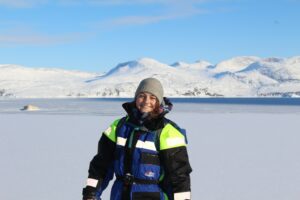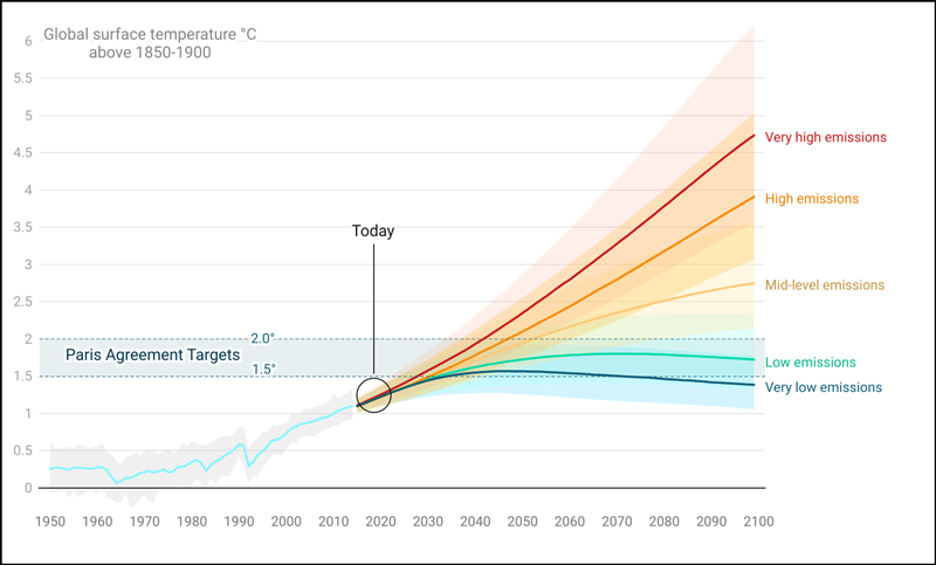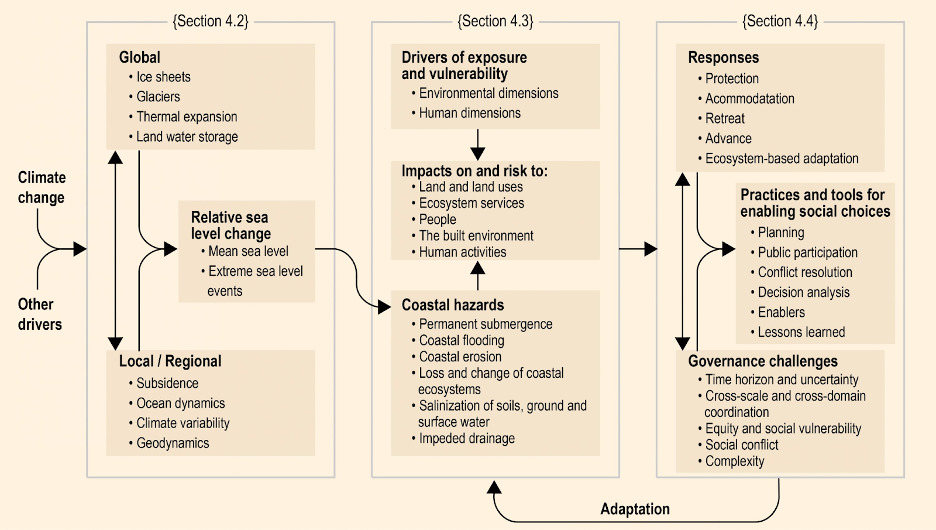by Taylor Azizeh and Basil Darby, MLML Vertebrate Ecology Lab and MLML Physical Oceanography Lab


These days, “climate change” seems like a buzzword in many settings. However, the rapid and devastating effects of an anthropogenically-shifting climate are at the forefront of scientists’ minds at Moss Landing Marine Laboratories (MLML). Underneath the brilliant science happening in our small community and amidst administrative bureaucracy, there is a stormy, ominous cloud hanging over our heads, echoing the same collective thought: What are we going to do about climate change?
As we write this in early September 2022, California is experiencing one of the most extreme heat waves ever recorded in the western United States at this time of year. On the other side of the world, after months of endless monsoons which have resulted in ten times the average rainfall, over one-third of Pakistan is underwater, with massive floods displacing millions of people. Pakistan contributes only 0.6% of global CO2 but is facing devastating repercussions. This is becoming an all-too-familiar story for most of the global south.
It’s undeniable that excess carbon dioxide produced by humans through industry, energy production, transportation, and more is affecting the entire planet in innumerable ways, including via heat waves. To quote the United Nations (UN) Intergovernmental Panel on Climate Change (IPCC):
“It is unequivocal that human influence has warmed the atmosphere, ocean and land. Widespread and rapid changes in the atmosphere, ocean, cryosphere and biosphere have occurred.” [1]
The world’s oceans, which cover 70% of the Earth, have acted as a massive carbon sink by absorbing 90% of the excess heat produced by increased carbon emissions [1]. Studying the ocean’s role in global systems is an overarching objective of researchers at MLML. We are a consortium institution that was founded in a spirit of collaboration across CSU campuses and disciplines, with the goal of “advancing marine science, serving society, and transforming public discourse and policy towards sustainable human interaction with the world.”
As such, researchers here cover an incredibly wide range of topics. For the most part, we are acutely interested in how climate change affects marine systems, ranging from mammals to invertebrates to large-scale oceanographic processes (for examples of this, see Table 1).
Table 1. Examples in the literature of how climate change can affect the eight main faculty research groups at MLML.
| Lab | Sources |
| Biological Oceanography | Gradinger (1996), Thompson et al. (2015) |
| Chemical Oceanography | Altieri & Gedan (2014), Hoegh-Guldberg et al.(2007) |
| Geological Oceanography | Hunt et al. (2013), Trenhaile et al. (2010) |
| Ichthyology Lab | Genner et al. (2010), Pörtner et al. (2007) |
| Invertebrate Ecology | Byrne et al. (2020), Reddin et al. (2020) |
| Phycology Lab | Assis et al. (2018), Krumhansel et al. (2013) |
| Physical Oceanography | Bakun et al. (1990), van Leeuwen et al. (2022), |
| Vertebrate Ecology | Kovacs & Lydersen (2008), Forcada & Trathan (2009) |
It’s happening now… and it’s serious
The negative effects of anthropogenic climate change are innumerable and could range from food shortages and an increased risk of disease to all-out wars over water rights and access (see the IPCC report [1] for a more complete list). It has also been shown that human impacts are causing what is known as the sixth mass extinction [3]. It’s impossible to overstate the implications resulting from this, especially if we continue along the same trajectory of emissions (Figure 1).
The U.S. economy is projected to lose between about 1% to 4% of its gross domestic product (GDP) annually by 2100 through shifts in mortality, labor, production, agriculture, crime, and coastal storms under a high emissions scenario. The question, therefore, is not “How can we afford to implement solutions?”, but rather: How can we afford not to?
“Accelerated and equitable climate action in mitigating, and adapting to, climate change impacts is critical to sustainable development.” [2]

One of the first steps in addressing a problem is identifying the root cause. The individual is not to blame. There have been many examples of how companies like Exxon Mobil influence policy by lobbying politicians, producing disinformation campaigns, and actively preventing solutions. And considering US taxpayers are subsidizing the fossil fuel industry with about $20.5 billion per year, one could argue that these companies have been extremely successful.
A collaborative and collective effort of communities is a powerful tool that we have at our disposal. We must utilize it if we have any chance at addressing these threats to human civilization and our global ecosystem. As daunting as it is to stand up to large corporations, the power really is with the people. Once enough people recognize this, we can start to take steps to enact change.
Moss Landing Marine Labs Climate Collective (MCC)
The brunt of climate impacts will be felt locally at first – which is the most important place we can enact change. Many local governments already have action plans which include reductions in CO2 targets and other measures. Many scientists aim to produce objective, accessible science and aren’t always ready to get involved by making political statements. However, the Moss Landing Marine Labs Climate Collective (MCC) believes that it is no longer just a political issue. We believe that politics, social justice, and science are intimately intertwined (Figure 2). Therefore, we seek to facilitate discussions, increase collaborative learning and research, and push for climate solutions and action plans.

Combating the climate crisis while doing thesis work, completing coursework, and working potentially 1-3 jobs may seem like an overwhelming or impossible task. Even if you are not a graduate student, working in the job force while slowly seeing the climate crisis unfold can make you feel powerless. But working towards climate action is possible and it must be done. The U.S. is the second-largest producer of greenhouse gas emissions, and this being a global issue means that we are all under an obligation to give what time and energy we can to this.
If we share the burden together, the weight on our shoulders will feel so much lighter.
What does it mean to you to be part of the Moss Landing Marine Labs community when faced with such an existential threat to human civilization?
It means coming together to face these problems head-on. Everything from advocating divestment from fossil fuels to making local initiatives more accessible to the Moss Landing community. Solutions to the climate crisis need to also address complex issues like race, class, gender, and sexuality.
MCC Mission Statement:
“We are a collective of students from the Moss Landing Marine Laboratory CSU consortium that strives to advocate for the implementation of sustainable university and community-wide practices. We believe that politics, social justice, and science are intimately intertwined, and therefore we created the MLML Climate Collective (MCC) which aims to support action towards combating causes of anthropogenically-driven climate change through tangible measures, such as:
- Obtaining comprehensive carbon neutrality plans (without carbon offsets) with a detailed timeline from home campuses
- Creating a dialogue about university divestment in fossil fuels
- Identifying and implementing sustainable campus living measures, including power generation and conservation, responsible recycling (e.g. food, clothes, electronics), and campus water management
- Recognition of intersectionality (i.e. class, gender, race, sexuality, etc.) in climate response
- Providing a safe space and inclusive environment to openly discuss climate issues and ways to support the MLML community”
These next couple of decades will be a challenge for everyone, so we kindly invite you to join us in the MLML Climate Collective. If you are interested in being involved please contact us.
References
[1] IPCC, 2022: Climate Change 2022: Impacts, Adaptation, and Vulnerability. Contribution of Working Group II to the Sixth Assessment Report of the Intergovernmental Panel on Climate Change [H.-O. Pörtner, D.C. Roberts, M. Tignor, E.S. Poloczanska, K. Mintenbeck, A. Alegría, M. Craig, S. Langsdorf, S. Löschke, V. Möller, A. Okem, B. Rama (eds.)]. Cambridge University Press. In press.
[2] IPCC, 2022: Climate Change 2022: Mitigation of Climate Change. Contribution of Working Group III to the Sixth Assessment Report of the Intergovernmental Panel on Climate Change [P.R. Shukla, J. Skea, R. Slade, A. Al Khourdajie, R. van Diemen, D. McCollum, M. Pathak, S. Some, P. Vyas, R. Fradera, M. Belkacemi, A. Hasija, G. Lisboa, S. Luz, J. Malley, (eds.)]. Cambridge University Press, Cambridge, UK and New York, NY, USA. doi: 10.1017/9781009157926
[3] Ceballos, Gerardo, Paul R Ehrlich, and Rodolfo Dirzo. “Biological Annihilation via the Ongoing Sixth Mass Extinction Signaled by Vertebrate Population Losses and Declines.” Proceedings of the National Academy of Sciences - PNAS 114.30 (2017): E6089–E6096.
Gradinger, R. (1995). Climate Change and Biological Oceanography of the Arctic Ocean. Philosophical Transactions of the Royal Society A: Mathematical, Physical and Engineering Sciences, 352(1699), 277–286. doi:10.1098/rsta.1995.0070
Thompson, Peter A. et al. “Climate Variability Drives Plankton Community Composition Changes: The 2010–2011 El Niño to La Niña Transition Around Australia.” Journal of Plankton Research 37.5 (2015): 966–984.
Altieri, AH, and KB Gedan. “Climate Change and Dead Zones.” Global Change Biology 21.4 (2015): 1395–1406.
Hoegh-Guldberg, O et al. “Coral Reefs Under Rapid Climate Change and Ocean Acidification.” Science (American Association for the Advancement of Science) 318.5857 (2007): 1737–1742.
Hunt, James E. et al. “Frequency and Timing of Landslide-Triggered Turbidity Currents Within the Agadir Basin, Offshore NW Africa: Are There Associations with Climate Change, Sea Level Change and Slope Sedimentation Rates?” Marine Geology 346 (2013): 274–291.
Trenhaile, Alan S. “Modeling Cohesive Clay Coast Evolution and Response to Climate Change.” Marine Geology 277.1 (2010): 11–20.
Genner, Martin J. et al. “Body Size-Dependent Responses of a Marine Fish Assemblage to Climate Change and Fishing over a Century-Long Scale.” Global Change Biology 16.2 (2010): 517–527.
Pörtner, Hans O, and Rainer Knust. “Climate Change Affects Marine Fishes Through the Oxygen Limitation of Thermal Tolerance.” Science (American Association for the Advancement of Science) 315.5808 (2007): 95–97.
Byrne, Maria et al. “Limitations of Cross— and Multigenerational Plasticity for Marine Invertebrates Faced with Global Climate Change.” Global Change Biology 26.1 (2020): 80–102.
Reddin, Carl J., Ádám T. Kocsis, and Wolfgang Kiessling. “Marine Invertebrate Migrations Trace Climate Change over 450 Million Years.” Global Ecology and Biogeography 29.7 (2020): 1280–1282.
Assis, Jorge, Miguel B. Araújo, and Ester A. Serrão. “Projected Climate Changes Threaten Ancient Refugia of Kelp Forests in the North Atlantic.” Global Change Biology 24.1 (2018): e55–e66.
Krumhansl, Kira A, Jean-Sébastien Lauzon-Guay, and Robert E Scheibling. “Modeling Effects of Climate Change and Phase Shifts on Detrital Production of a Kelp Bed.” Ecology (Durham) 95.3 (2014): 763–774. Web.
Bakun, A. “Global Climate Change and Intensification of Coastal Ocean Upwelling.” Science (American Association for the Advancement of Science) 247.4939 (1990): 198–201.
van Leeuwen, SM et al. “The Mediterranean Rhodes Gyre: Modelled Impacts of Climate Change, Acidification and Fishing.” Marine Ecology Progress Series (Halstenbek) 690 (2022): 31–50. Web.
Kovacs, Kit M, and Christian Lydersen. “Climate Change Impacts on Seals and Whales in the North Atlantic Arctic and Adjacent Shelf Seas.” Science Progress (1916) 91.2 (2008): 117–150. Web.
Forcada, Jaume, and Trathan, PN. “Penguin Responses to Climate Change in the Southern Ocean.” Global Change Biology 15.7 (2009): 1618–1630. Web.
Crippa, M., Guizzardi, D., Solazzo, E., Muntean, M., Schaaf, E., Monforti-Ferrario, F., Banja, M., Olivier, J.G.J., Grassi, G., Rossi, S., Vignati, E.,GHG emissions of all world countries - 2021 Report, EUR 30831 EN, Publications Office of the European Union, Luxembourg, 2021, ISBN 978-92-76-41547-3, doi:10.2760/173513, JRC126363

